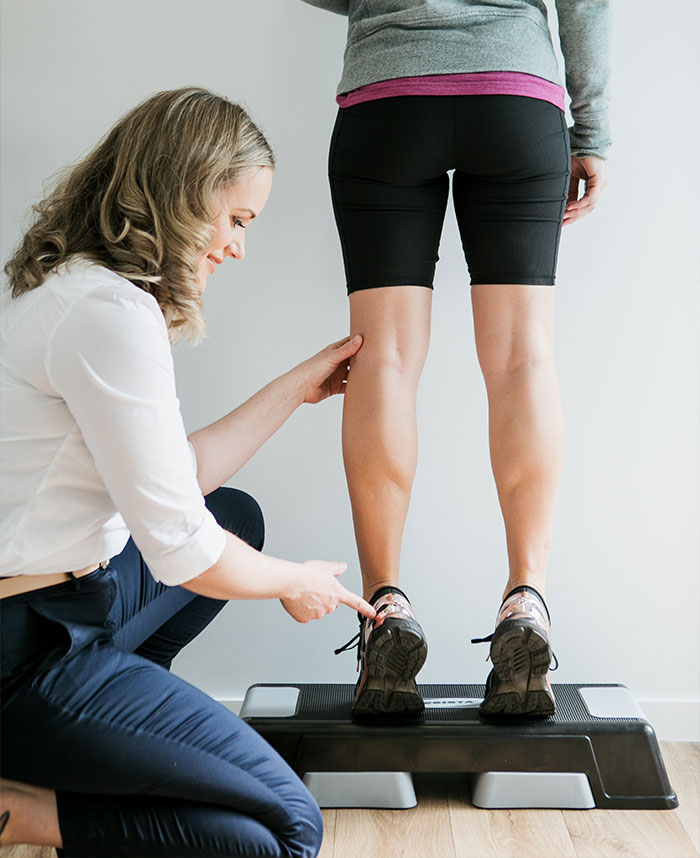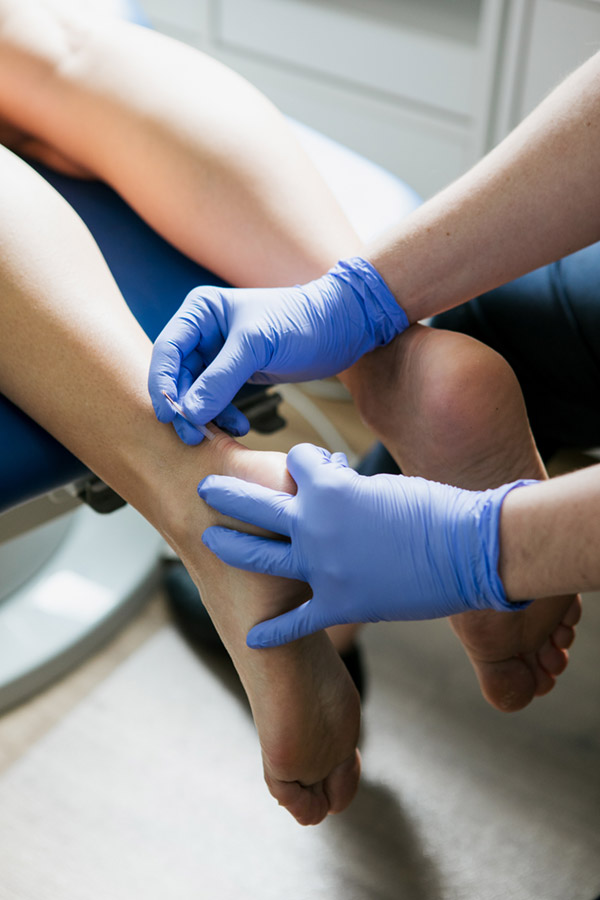Achilles Tendinopathy
What is the Achilles tendon?
The achilles tendon is a structurally tough fibrous band that attaches your calf muscle to your heel bone. The action this muscle performs in plantar flexion of your foot or helps you to rise onto your tip toes like when walking or climbing stairs.

What is Achilles Tendinitis / Achilles Tendinopathy?
Insertional Achilles tendinopathy is pain at the heel bone.
Mid portion Achilles Tendinopathy is 2-6cm above the heel bone and sometimes you can see and feel a swollen area.
This can be a debilitating problem for any athlete or active person. It often develops from overuse, leading to tiny tears and weakening over time, rather than just simple inflammation. Often the pain is most severe when first getting out of bed in the morning.
Any sports which involve running or jumping can cause Achilles tendonitis, such as the weekend warrior runner or playing sports such as football, tennis and or volleyball, although is may also occur through simple fitness walking.
If you’re feeling persistent heel pain, know that it’s common and treatable with the right care.
Symptoms of Achilles Tendinopathy
You might notice a dull ache or stiffness in the back of your heel, especially first thing in the morning or after sitting for a while. Pain can build during activities like running or jumping, and there may be swelling, tenderness when touched, or a sense of warmth around the area. In some cases, the tendon feels thickened or you hear a creaking sensation. These signs can start mildly but worsen if ignored—listening to your body early can make a big difference.

Causes of Achilles Tendinopathy
This issue usually stems from repeated strain on the tendon, such as:
- Suddenly ramping up exercise.
- Explosive movements like basket ball, tennis, soccer and ultimate frisbee involving quick starts and stops.
- Wearing unsupportive shoes.
- Training on hard or uneven surfaces.
- Having tight calf muscles that pull too hard.
- Weakness in calf muscles.
- Stiffness in foot joints.
Other risk factors include:
- Age-related wear (more common in men aged 30 – 50).
- Extra body weight adding pressure
- Conditions like diabetes that affect healing.
- Biomechanical issues like flat feet or improper gait.
- With underlying degenerative change it can be as simple as stepping off a curb awkwardly.
Understanding the trigger helps in preventing it from coming back.
Diagnosis
Physical Examination
Your podiatrist will start by chatting about your symptoms, activity levels, and any recent changes, then gently examine the area for tenderness, swelling, or limited motion.
Imaging
Imaging tests like ultrasound or MRI lets us examine the extent of the issues and check for tears, providing clear next steps.

Treatment for Achilles Tendinitis
At Buderim Foot & Ankle, we offer gentle, personalized options to ease your discomfort, promote healing and prevent recurrence:
- Rest from aggravating sporting activities
- Exercise prescription with guided stretches and strengthening routines to rebuild resilience safely.
- Gait and running assessments to spot and correct movement patterns that contribute to the problem.
- Footwear assessments and modifications to ensure your shoes provide the right cushioning and fit.
- Strapping for immediate support and stability during daily activities.
- Custom orthotics to support your foot’s natural alignment and reduce strain.
- Shockwave therapy, a non-invasive treatment using sound waves to stimulate healing.
- Dry needling to release tight spots in surrounding muscles.
Many people see improvement with these conservative approaches. If the damage to the tendon is too severe to find relief from pain with conservative methods, surgery may be considered.
Preventive Measures
To keep tendinopathy at bay, warm up before activities, stretch your calves daily, choose shoes with good heel support, and gradually increase workout intensity.
When to see a Podiatrist
If your heel pain lingers more than a few days, disrupts sleep, or doesn’t improve with rest, it’s wise to consult a podiatrist. Early help can prevent complications like tendon rupture, and we’re here to listen, explain, and guide you back to comfort.
At our Sunshine Coast Podiatry clinic, our experienced podiatrists take a holistic, personalised, and thorough approach to treating Achilles tendinitis. Our treatment plans are tailored to your specific needs and lifestyle goals.
If you’re experiencing symptoms of Achilles tendinitis, make an appointment today by calling 07 5338 7387 or book online:
